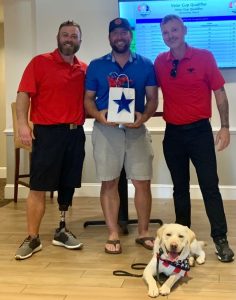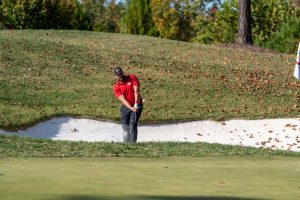Hidden Wounds Take Longest to Heal: Remembering Brad Pierce
Hidden wounds take the longest to heal. Of course, we know this. It’s why we founded Leashes of Valor nearly six years ago. But knowing a thing—being certain of it—cannot prepare you for losing a friend to the unseen wounds of war we talk so much about.
Brad Pierce graduated from high school three years after the Sept. 11 terrorist attacks. He got offers to play football for colleges. But that awful day that propelled this country into two decades of war was still fresh on his mind in 2004. He enlisted in the Marines and deployed three times to Iraq over the next six years, earning two Purple Hearts.
We met Brad last year when he qualified to play in the inaugural Valor Cup, a golf tournament that raises money for our mission providing psychological service dogs to military veterans. Brad was a beast of a man—in presence and stature but most of all in personality. His laugh could infuse a room, and we watched how it cracked even serious men into unadulterated laughter. On the golf course, Brad had one speed—110%. He loved the game of golf, and he was happiest when he was slinging massive draws with his driver.

Brad Pierce (center) with fellow Marines Chris Bowers, LOV’s program manager, and Jason Haag, LOV founder and CEO.
Brad spoke of his wartime injuries matter-of-factly, telling us once: “I was blown up four times. I didn’t lose any limbs, but I took some shrapnel … In the big picture, I was lucky. I took some bruising on the brain, but physically now, I’m OK.”
You can be physically OK but not mentally OK. We know that. And if anything could make worse news of Brad’s death, it is this.
PTSD is real. Men and women struggle with it daily, often with smiles on their faces. They suffer in silence for fear of being labeled. Sometimes, these hidden battles waged in private become too much to bear.
One of our primary goals—regardless of whether we are providing service dogs or golfing opportunities to veterans—is to create an environment in which our warriors feel comfortable sharing their struggles so we can offer help. This is the most important thing we do at Leashes of Valor.

Brad was part of LOV’s inaugural Valor Cup, a golf tournament that raises money for our mission providing service dogs to veterans.
Brad was a friend, a brother, a U.S. Marine, and an ambassador for the game of golf. His loss hurts. It should hurt. We have to let it hurt, to burn it into our memories so that it can motivate us to do more, to see where we fall short and what we can do better. Brad spent only a few months with the Valor Cup, but his impact will stay with us. We are thankful for the time we had with him. Our goal is to reach more, find more, and help more of our brothers and sisters who are struggling.
If you’re suffering in silence, please know that you are not alone. We’re here to listen and do our best to help. If you need to speak with someone immediately, please call the National Suicide Prevention Line at 988 (veterans press 1).
